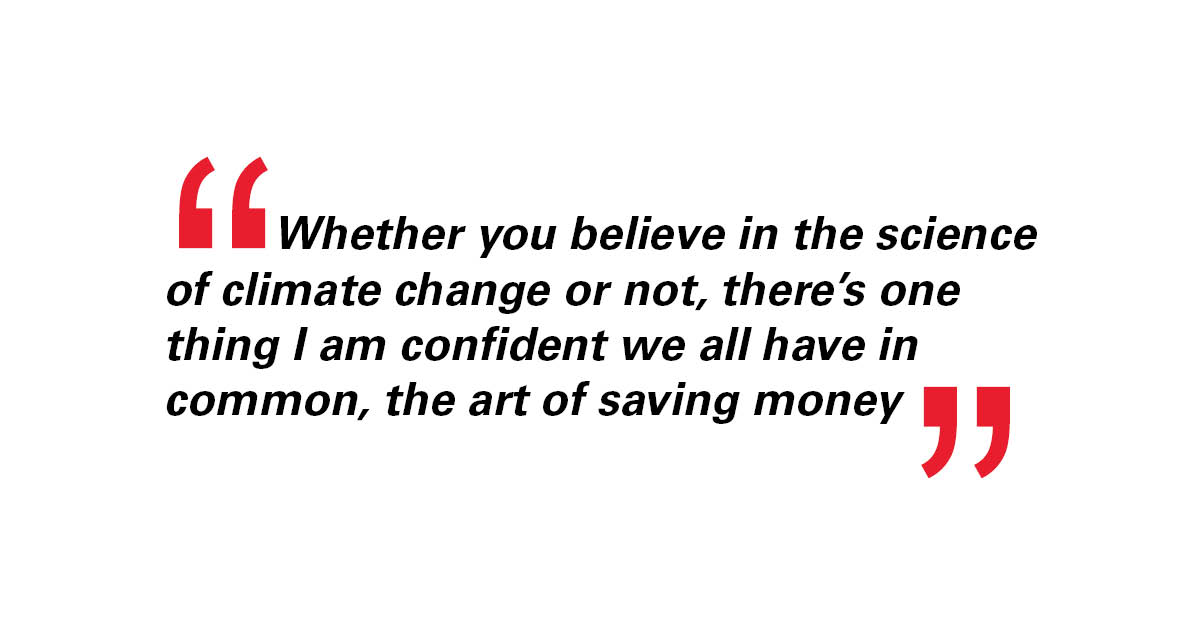Written by Adam Scully - Chief Sales Officer
There’s a saying that goes, ‘with great power comes great responsibility’. While I admit I’ve improvised the meaning of the original saying, in the world of data centres it rings true.
Data centres are massive consumers of energy as they house, power and cool immense amounts of hot and hungry IT equipment. Our reliance on technology continues to accelerate; Businesses are having to support increasingly distributed environments that are creating more data, relying on more connections which requires more physical infrastructure to store it and processing capacity to power and cool it.
The rise of cloud computing is undoubtedly the major catalyst for the digitalisation and transformation of organisations, and the reliance we place on the digital infrastructure that powers our personal and business lives. The more applications, workloads and physical IT infrastructure needed to power high density and high-performance environments, the more energy that’s consumed, resulting in more harmful carbon that’s released into the atmosphere.
If you do the math of just how much power is needed to fuel the digital economy, the numbers are staggering. It’s estimated that as much as 2% of the world’s energy usage comes from data centres, so sustainable data centre operations are no longer a nice to have in business – they’re essential. In fact, sustainability has become a core business strategy for companies of all sizes.
Sustainable business is productive business
As cloud deployments continue to scale, the need for flexible and connected infrastructure that can adjust, anticipate and respond to demand is critical. As more workloads shift to cloud, and inhouse physical IT footprint continues to decrease, the need for specialist colocation cloud data centres becomes compelling. Significantly lower costs and enhanced operational capacity has been reason enough for many to shut down their inhouse computer rooms and enterprise data centres and consume computational power as a pay-as-you-go service. Cloud is ingrained in our everyday lives and, as such, the world needs cloud data centres.
Business sustainability is essential to the long-term prosperity of today’s businesses. Business leaders are essentially operating out of a fishbowl, where everything they do is on display as social media allows this information to travel worldwide in seconds. This is seeing modern CEO’s incorporating broader sustainability principles into their everyday business decisions.
So when we consider the challenge of business sustainability, just like the old nursey rhyme – we can’t go around it, we can’t go over it, we have to go through it - head on, with a sustainable plan of action.
As leaders in business, finding that sweet spot of operating as efficiently and profitably as possible is a responsibility we all share. By introducing a higher focus on sustainable practices, you open the door to more efficient ways of doing business. One of the efficiencies derived comes in the form of cost savings, enabling that money to be reinvested where your business needs it most.
A high-performance environment that’s good for business, and the environment
The rise of hyperscale computing is attributed to the emergence of the digitisation of business. Spending millions of dollars to build and operate a data centre just isn’t financially viable for most, but importantly it’s not their priority if it’s not their core competency. As a result, data and the infrastructure it lives on, is starting to migrate out of IT closets and on-premise computer rooms, into hyperscale facilities, which are specifically designed to scale easily.
To support a unified, high performance IT environment, with power costs soaring and the expectation to go ‘green’ rising – this is where Power Utilisation Effectiveness (PUE) takes centre stage. PUE is a common metric that determines how efficiently a data centre uses power. It’s calculated by dividing the total amount of power entering a data centre by the power actually being used to run the computing infrastructure within it. Put simply, the lower the PUE, the less power is used to run your IT infrastructure and therefore, the lower the cost will be. This is good for your bottom line, and the environment.
At their core, sustainable data centres begin with how they are designed, engineered, and ultimately operated. Renewable energy, carbon neutrality, and water and waste management are a fundamental part of NEXTDC’s foundations. More efficient data centres use less power and water, commodities which are a cost burden to business as prices rise. This means that every operational efficiency we introduce to the build and tuning of our data centres has a tangible bottom line benefit in terms of lower utility bills for customers.
While committing to finding innovative and effective solutions that serve to reduce the environmental footprint of data centres is seen by many within the industry as a challenge, it is possible. Whether you believe in the science of climate change or not, there’s one thing I am confident we all have in common, the art of saving money. Bottom line is that operating as a sustainable business frees up more of your revenue for the things that matter most to your organisation.

The operational and environmental sustainability of our data centres will continue to be a primary focus as we are 100% dedicated to supporting the growth of the digital economy, so digital businesses can thrive. But importantly, we are committed to doing it in the most sustainable way possible, to ensure a healthy, resource rich future for the generations to come.
It goes without saying that that being independently recognised for our commitment and innovative focus toward sustainability is the icing on the cake. We love celebrating wins and recognising our incredible team for their tireless work in helping us change the conversation, and build a strong, sustainable business. We were thrilled to be announced as a winner for the ABA100 Winner for Sustainability in The Australian Business Awards 2020. Judged on the focus we place on building and maintaining optimal sustainable practices across our business, we were humbled to be recognised as a leader in what is such an important global topic.
If you would like to know more about how leveraging the investments, we have made in energy efficiency can help you achieve your sustainability objectives and save money in the long run, get in touch.
There’s a saying that goes, ‘with great power comes great responsibility’. While I admit I’ve improvised the meaning of the original saying, in the world of sustainable data centres it rings true.


